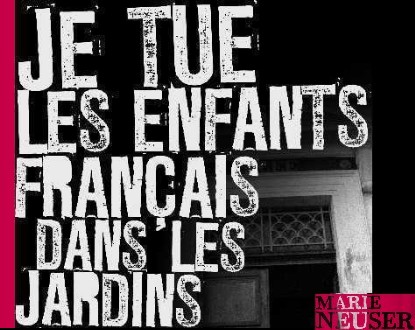Published in 2011 by L’écailler, this debut novel by Marie Neuser is a punchy read that you can’t put down, much like a detective novel, but it raises essential questions about the National Education system. With a strong, sometimes disturbing writing style, the story is uncompromising and, at times, so realistic that it sends shivers down your spine.
Lisa Genovesi is a young Italian teacher in a “grimy big city”, never named but quickly identifiable. Teaching in a highly sensitive high school, Lisa struggles more and more to manage her students, and it’s even worse when she tries to teach a lesson…
Insults, fights, threats, Lisa goes to work with fear in her stomach, anxiety rooted in her body. How can she get by? How can she simply survive?
“I Kill French Children in the Gardens” is a striking, chilling novel. We follow Lisa, a teacher of an enjoyable subject that matters even less to the students of the class 3ème 2, around which the story revolves. In this difficult class, Lisa struggles to deliver a proper lesson, and most of the time, it resembles utter chaos. The noise is incessant, the students are violent with each other and with Lisa, and the tension is perpetual.
Marie Neuser skillfully uses writing to craft this brutal story, where the sentences cut sharply, and the grime threatens at any moment to completely engulf Lisa. This novel is both very intense and deeply unsettling. Marie Neuser, herself a teacher, does not hesitate to give voice to the hatred that Lisa eventually begins to feel. She allows it to grow within the heroine, to mature into a climax as dark as it is amoral. “I Kill French Children in the Gardens” uniquely anchors itself in reality, allowing the reader to become lost and confuse the two. However, this book is not a testimony. Some parts are inspired by the author’s experiences, but we must not lose sight of the fact that it is fiction.
Thus, the author can afford to present Lisa’s extreme point of view. Pushed to the limit by the students – and it’s fair to say they don’t hold back – and abandoned by the system and her superiors, she spirals into hatred and despair where no student finds favor in her eyes. “Under my smile, that of a pretty woman who knows how to behave in society, I hide a desire to cry and give up as intensely as everything rising within me for some days now, the scandal of so many bad thoughts resembling an unknown hatred.” – page 108
She loses her illusions, the hope that the world can change, that respect still exists. Similarly, when she compares her father’s teaching career – which inspired her to teach – with her own, Lisa feels a lot of bitterness and tunes into the refrain of “it was better before.” Lisa is also hurt by society’s view of her profession, the complaints about the summer breaks and the accusation that all teachers are lunatics.
This character can no longer adapt; she is drowning in fear, nearing her breaking point, and sees everything in black and white. She is touching and fascinating, and we quickly empathize with her. Her case is extreme, brutal, and disturbing because it is understandable. One might think that, in her place, we would feel the same, make the same choices. Despite the conditions in which she works, she does not take leave, showing a certain courage that many would not have had.
The essence of Marie Neuser’s novel is that once closed, it lingers in the reader’s mind. It raises essential and vital questions about education and the school system – what solutions exist in the face of violence, detachment, disrespect, and indifference. It does not analyze – we remain within the detective genre – it takes an extreme stance, and in that sense, it is disturbing. What to do when students go too far? How to respond to insults and persistence? Lisa’s reaction is no better than those who do nothing and wait for it to pass…
What is certain is that one does not emerge unscathed.
Very well written, the true reflection begins only after the last page is turned.


